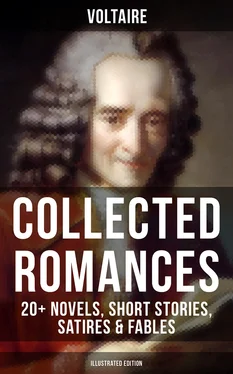Candide was quite stupefied at this affecting scene; he had suffered Cunegund to depart, without thinking of the proper measures which are always to be taken with those who know our secrets, when Cacambo presented himself to his sight. They embraced each other with tenderness. Candide informed him of the conversation he had just had; he was very much affected by the loss of the great Pangloss, who, after having been hanged and burned, was at last unhappily drowned. They spoke with that free effusion of heart which friendship inspires. A little billet thrown in at the window by Zenoida put an end to the conversation. Candide opened it, and found in it these words:
“Fly, my dear lover, all is discovered. An innocent propensity which nature authorizes, and which hurts no one, is a crime in the eyes of credulous and cruel men. Wolhall has just left my chamber, and has treated me with the utmost inhumanity: he is gone to obtain an order for thee to be clapped into a dungeon, there to perish. Fly, my ever dear lover; preserve a life which thou canst not pass any longer near me. Those happy moments are no more, in which we gave proofs of our reciprocal tenderness. Ah! my beloved, how hast thou offended heaven, to merit so harsh a fate? But I wander from the purpose: remember always thy precious, dear Zenoida, and thou, my dear lover, shalt live eternally within my heart — thou hast never thoroughly understood how much I loved thee — canst thou receive upon my inflamed lips my last adieu! I find myself ready to join my unhappy father in the grave; the light is hateful to me; it serves only to reveal crimes.”
Cacambo, always wise and prudent, drew Candide, who no longer was himself, along with him; they made the best of their way out of the city. Candide opened not his mouth, and they were already a good way from Copenhagen, before he was roused from that lethargy in which he was buried. At last he looked at his faithful Cacambo, and spoke in these terms:
CHAPTER XVII.
HOW CANDIDE HAD A MIND TO KILL HIMSELF, AND DID NOT DO IT — WHAT HAPPENED TO HIM AT AN INN.
Table of Contents
“Dear Cacambo, formerly my valet, now my equal, and always my friend, thou hast borne a share in my misfortunes; thou hast given me salutary advice; and thou hast been witness to my love for Miss Cunegund —” “Alas! my old master,” said Cacambo, “it is she who has served you this scurvy trick; it is she who, after having learned from your fellow-servants, that your love for Zenoida was as great as hers for you, revealed the whole to the barbarous Wolhall.” “If this is so,” said Candide, “I have nothing further to do but die.” Our philosopher pulled out of his pocket a little knife, and began whetting it with a coolness worthy of an ancient Roman or an Englishman. “What do you mean to do?” cried Cacambo. “To cut my throat,” answered Candide. “A most noble thought!” replied Cacambo; “but the philosopher ought not to take any resolution but upon reflection: you will always have it in your power to kill yourself, if your mind does not alter. Be advised by me, my dear master; defer your resolution till to-morrow; the longer you delay it, the more courageous will the action be.” “I perceive the strength of thy reasoning,” said Candide; “besides, if I should cut my throat immediately, the Gazetteer of Trévoux would insult my memory: I am determined, therefore, that I will not kill myself till two or three days hence.” As they talked thus they arrived at Elsinore, a pretty considerable town, not far from Copenhagen; there they lay that night, and Cacambo hugged himself for the good effect which sleep had produced upon Candide. They left the town at daybreak. Candide, still the philosopher, (for the prejudices of childhood are never effaced) entertained his friend Cacambo on the subject of physical good and evil, the discourses of the sage Zenoida, and the striking truths which he had learned from her conversation. “Had not Pangloss been dead,” said he, “I should combat his system in a victorious manner. God keep me from becoming a Manichæan. My mistress taught me to respect the impenetrable veil with which the Deity envelopes His manner of operating upon us. It is perhaps man who precipitates himself into the abyss of misfortunes under which he groans. From a frugivorous animal he has made himself a carnivorous one. The savages whom we have seen, eat only Jesuits, and do not live upon bad terms among themselves. These savages, if there be one scattered here and there in the woods, only subsisting on acorns and herbs, are, without doubt, still more happy. Society has given birth to the greatest crimes. There are men in society, who are necessitated by their condition to wish the death of others. The shipwreck of a vessel, the burning of a house, and the loss of a battle, cause sadness in one part of society, and give joy to another. All is very bad! my dear Cacambo, and there is nothing left for a philosopher but to cut his own throat with all imaginable calmness.” “You are in the right,” answered Cacambo; “but I perceive an inn; you must be very dry. Come, my old master! let us drink one draught, and we will after that continue our philosophical disquisitions.”
When they entered the inn they saw a company of country lads and lassies dancing in the midst of the yard, to the sound of some wretched instruments. Gayety and mirth sat in every countenance; it was a scene worthy the pencil of Watteau. As soon as Candide appeared a young woman took him by the hand, and entreated him to dance. “My pretty maid,” answered Candide, “when a person has lost his mistress, found his wife again, and heard that the great Pangloss is dead, he can have little or no inclination to cut capers. Moreover, I am to kill myself to-morrow morning; and you know that a man who has but a few hours to live, ought not to lose them in dancing.” Cacambo, hearing Candide talk thus, addressed him in these terms: “A thirst for glory has always been the characteristic of great philosophers. Cato of Utica killed himself after having taken a sound nap. Socrates drank the hemlock potion, after discoursing familiarly with his friends. Many of the English have blown their brains out with a pistol, after coming from an entertainment. But I never yet heard of a great man who cut his own throat after a dancing bout. It is for you, my dear master, that this honor is reserved. Take my advice, let us dance our fill, and we will kill ourselves to-morrow.” “Have you not remarked,” answered Candide, “this young country girl? Is she not a very pretty brunette?” “She has something very taking in her countenance,” said Cacambo. “She has squeezed my hand,” replied the philosopher. “Did you notice,” said Cacambo, “how that in the hurry of the dance, her handkerchief falling aside, disclosed two admirable little rosebuds? I took particular notice of them.” “Look you,” said Candide, “had I not my heart filled with Miss Zenoida —.” The little brunette interrupted him, by begging him to take one dance with her. Our hero at length consented, and danced with the best grace in the world. The dance finished, he kissed his smart country girl, and retired to his seat, without calling out the queen of the ring. Upon this a murmuring arose; everyone, performers as well as spectators, appeared greatly incensed at so flagrant a piece of disrespect. Candide never dreamed he had been guilty of any fault, and consequently did not attempt to make any reparation. A rude clown came up to him, and gave him a blow with his fist upon the nose. Cacambo returned it to the peasant with a kick in the belly. In an instant the musical instruments were all broken, the girls lost their caps; Candide and Cacambo fought like heroes, but at length were obliged to take to their heels, after a very hearty drubbing.
Читать дальше












